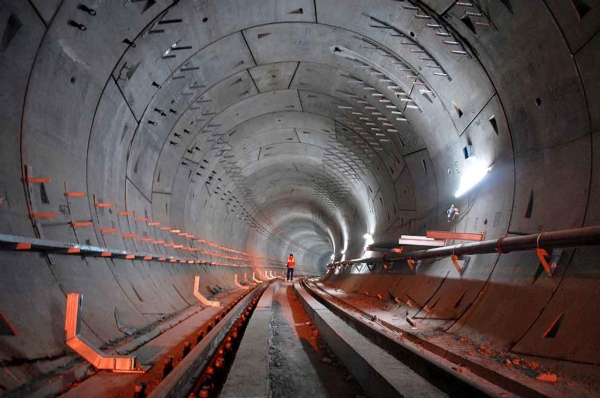Asia’s Longest tunnel in J&K, coming 3 years Ahead of Time!
Asia"s longest bi-directional tunnel, the Zojila tunnel being constructed at breakneck speed in J&K
Total Views |
- Kinjal Yogesh Dixit
Asia's longest bi-directional tunnel - the 'all-weather connectivity' Zojila tunnel is being constructed at a breakneck speed in the geo-strategically sensitive terrain of Jammu and Kashmir. In order to oversee the construction of the tunnel, Union Minister Nitin Gadkari reviewed it and said that he is satisfied with the pace of work going on.

The deadline for the completion of the project, worth Rs. 4,600 crores, was 2026 before but now is expected to be completed by December 2023 - which is well ahead of its schedule time. Upon completion, the Zojila tunnel will be India’s longest road tunnel as well as the world's highest tunnel, according to the government. Gadkari visited the twin tunnel projects - Z-Morh and Zojila, which are on the Srinagar-Leh highway. Here, he reviewed the progress and pace of work.
National Highways and Infrastructure Development Corporation ED Brigadier Gurjeet Singh Kambo said, “Zojila Tunnel project will make the travel on Srinagar-Kargil-Leh Section of NH-1 free from avalanches. We are aiming for earlier execution than the targeted completion of the project by 2026. Excavation works are going in full swing and dynamics and topography of the region will change with the help of this project.”
Besides, Gadkari visited East portal of main Zojila tunnel near Meenamarg on the Kargil side, West portal of Zojila tunnel near Baltal, Sonamarg and reviewed the progress of the work. On the other hand, projects worth Rs. 1 lakh crore are currently being implemented in Jammu, Kashmir and Ladakh on tunnels and road infrastructure. Gadkari said, “There are many projects going on or in the pipeline for J&K,” sand among the projects, 6 are most important for socio-economic development of Jammu, Kashmir.
Asia's longest bi-directional tunnel - the 'all-weather connectivity' Zojila tunnel is being constructed at a breakneck speed in the geo-strategically sensitive terrain of Jammu and Kashmir. In order to oversee the construction of the tunnel, Union Minister Nitin Gadkari reviewed it and said that he is satisfied with the pace of work going on.

The deadline for the completion of the project, worth Rs. 4,600 crores, was 2026 before but now is expected to be completed by December 2023 - which is well ahead of its schedule time. Upon completion, the Zojila tunnel will be India’s longest road tunnel as well as the world's highest tunnel, according to the government. Gadkari visited the twin tunnel projects - Z-Morh and Zojila, which are on the Srinagar-Leh highway. Here, he reviewed the progress and pace of work.
National Highways and Infrastructure Development Corporation ED Brigadier Gurjeet Singh Kambo said, “Zojila Tunnel project will make the travel on Srinagar-Kargil-Leh Section of NH-1 free from avalanches. We are aiming for earlier execution than the targeted completion of the project by 2026. Excavation works are going in full swing and dynamics and topography of the region will change with the help of this project.”
The Srinagar-Leh highway, which connects Kashmir valley with Ladakh, snows in at the Zojila pass for 4-6 months every year. Apart from this, during winters, the condition of people worsens as they are cut off, and have no supplies and no medical help. To get through these challenges, many bridges are being built along this route. A connecting tunnel starting from Z-Morh to Zojila tunnel is to be constructed in the Zojila ghat, between Sonamarg and Kargil.
The work for this is being divided in 2 divisions in 33 km span. It is commendable how at a height of more than 11,500 feet, another 14.5 kms long Zojila tunnel is being built between Baltal and Minamarg. Besides, once it is completed, the distance will be cut down from 40 kms to 13 kms. The travel time will reduce from 3.5 hours to a drive of no more than 15 mins. These better transportation networks will boost the tourism sector in the region and generate employment opportunities for locals.
Also Read | Development of Infrastructure in India (Roads)
It includes the appropriate safety measures like the vertical shafts at 3 places and adequate security and lighting measures with CCTV, fire alarms and heat detection systems at par with the international standards. The strategically important tunnel of the Z-Morh tunnel will ensure that supplies to Sonamarg are connected and have access to supplies year-long. The Zojila tunnel, beyond Sonamarg, will give all-weather connectivity between Srinagar and Ladakh.
The tunnel will basically solve all the connectivity issues, and hence will prove to be an important asset for armed forces. It will also create opportunities for further economic development in the area. The tunnel, which is covered from the top, will provide a passage safe from avalanches in the winter months. It will ensure safer travel for defence and military vehicles, which are active in the border territory.
Besides, Gadkari visited East portal of main Zojila tunnel near Meenamarg on the Kargil side, West portal of Zojila tunnel near Baltal, Sonamarg and reviewed the progress of the work. On the other hand, projects worth Rs. 1 lakh crore are currently being implemented in Jammu, Kashmir and Ladakh on tunnels and road infrastructure. Gadkari said, “There are many projects going on or in the pipeline for J&K,” sand among the projects, 6 are most important for socio-economic development of Jammu, Kashmir.
Also Read | Highway Construction in India gets a Boost
Notably, since 2014, (after BJP took over the government), the National Highway has a growth from 1695 km to 2664 km. There has been an increase of 969 kms on the National Highway. In the next 2 years, the government of India will provide infrastructure facilities more than those that have been given in the past 50 years in Jammu and Kashmir, Gadkari ensured.